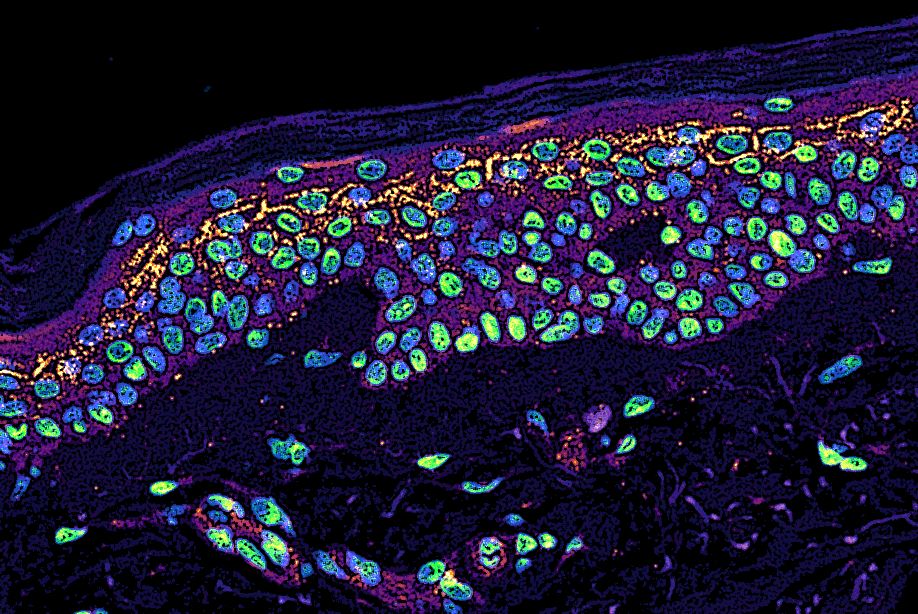Pathologies of Cutaneous Inflammation

Our research focuses on the mechanisms of cutaneous inflammation using psoriasis as a model disease. Our interest is to understand the diverse cellular mechanisms that drive cutaneous inflammatory disorders. For several years, our group has been working on the biology of IL-17 family cytokines, documenting their key role in epidermal homeostasis as well as the contribution to TH1- as well as TH2-driven inflammation.
Currently, we expand our studies to the regulation of mechanotransduction (cell perception of mechanical stimuli) and alteration of keratinocyte-fibroblast interactions in the development of skin inflammation and fibrosis. We primarily focus on two inflammatory diseases in the skin - psoriasis and systemic sclerosis - that represent opposite extremes in the spectrum of inflammation-driven fibrosis.
In summary, we hope to substantially contribute to exploring the mechanotransduction pathways as targets to treat cutaneous inflammation. This is a hot topic in translational research and some molecules are already in advanced stages of clinical development or even in clinical use.
Specific expertise
We are particularly experienced in translational research in cutaneous inflammation, with a focus on psoriasis, systemic sclerosis, cellular immunology, and cytokine biology. The group routinely operates co-culture systems and analyses clinical material (e.g. biopsies). We have established a sophisticated organotypic cell culture system for human epidermis and dermis, which we increasingly use to investigate the complex cell-cell interactions. We apply in vitro cytokine stimulation models to mimic psoriatic inflammation and use mechanoculture (cell-stretch) device to investigate the epidermal and dermal mechanoregulation. Finally, we use rodent models for cutaneous inflammation including psoriasis and wound healing.
Selected Publications
Shutova MS, Borowczyk J, Russo B, Sellami S, Drukala J, Wolnicki M Brembilla N, Kaya G, Ivanov AI, Boehncke WH. Inflammation Modulates Intercellular Adhesion and Mechanotransduction in Human Epidermis via ROCK2. iScience. 2022. http://dx.doi.org/10.2139/ssrn.4117927
Russo B, Borowczyk J, Cacialli P, Moguelet P, Truchetet ME, Modarressi A, Brembilla NC, Bertrand J, Boehncke WH, Chizzolini C. IL-25 participates in keratinocyte-driven dermal matrix turnover and is reduced in Systemic Sclerosis epidermis. Rheumatology (Oxford). 2022 Feb 16:keac044. doi: 10.1093/rheumatology/keac044. Epub ahead of print. PMID: 35171244.
Borowczyk J, Buerger C, Tadjrischi N, Drukala J, Wolnicki M, Wnuk D, Modarressi A, Boehncke WH, Brembilla NC. IL-17E (IL-25) and IL-17A Differentially Affect the Functions of Human Keratinocytes. J Invest Dermatol. 2020 Jul;140(7):1379-1389.e2. doi: 10.1016/j.jid.2019.12.013. Epub 2020 Jan 18. PMID: 31958433.
Senra L, Mylonas A, Kavanagh RD, Fallon PG, Conrad C, Borowczyk-Michalowska J, Wrobel LJ, Kaya G, Yawalkar N, Boehncke WH, Brembilla NC. IL-17E (IL-25) Enhances Innate Immune Responses during Skin Inflammation. J Invest Dermatol. 2019 Aug;139(8):1732-1742.e17. doi: 10.1016/j.jid.2019.01.021. Epub 2019 Feb 6. PMID: 30738055.
Boehncke WH, Schön MP. Psoriasis. Lancet. 2015 Sep 5;386(9997):983-94. doi: 10.1016/S0140-6736(14)61909-7. Epub 2015 May 27.Lancet. 2015. PMID: 26025581 Review.
28 Oct 2020